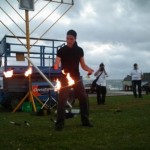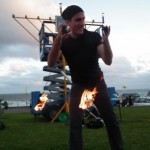Right now we’re staying with my cousin David in Sydney. He’s a really awesome guy who’s a psychiatrist by trade. The other day he had to do something for a particularly frustrating patient of his. He explained that he was experiencing what psychologists term “negative countertransference” – in other words, he was getting angry with this guy. This particular patient was just supremely annoying him. Which got me to thinking about things like anger (and negative countertransference)… and their solutions. Of course, where there is anger with a particular person, it should eventually be followed by forgiveness.
Forgiveness seems to be one of those things we human beings have the hardest time with. We always seem to tend toward one extreme or the other. Either we hold grudges or we forgive too easily. Either way, we end up getting hurt. Either we’re hurting ourselves by carrying past pain and anger… or we’re hurting ourselves by repeatedly trusting the wrong people over and over again.
In this week’s parsha, Yosef (Joseph) encounters his brothers again. He forgives them for selling him into slavery, a forgiveness that they are so shocked to hear they almost don’t believe it. But even here, Yosef’s forgiveness is somewhat understandable even to us average people. After all, he recognized after a while that G-d had a hand in all of this and that he could never have become viceroy over Egypt if he hadn’t been sent there as a slave. Everything in hindsight is 20/20. So here we find our first key to forgiveness: time makes clear the reasons why things happened the way they did, and heals our wounded emotions. After so many years in Egypt, Yosef both saw the bigger picture and he also had been given enough time for his hurt to have been healed. So too with us. After so much time has passed and we see how everything fits perfectly into place, we become able to forgive in a way that we weren’t able to before.
Of course, this doesn’t mean we should wait years to forgive someone who has hurt or wronged us. In fact, holding a grudge is forbidden in Torah and many groups of orthodox Jews have the custom to verbally state their forgiveness of everyone just before going to sleep at night. But if someone just wronged you this evening, how can you bring yourself to forgive them in a matter of hours?
When I was in Petra, Jordan I decided to climb to the top of one of the mountains there to get this amazing view of the famous treasury. When I got there, the view was indeed spectacular, but in trying to climb back from the viewing point, I had to get over a large boulder and the only way I could get up was to bounce myself over it. As I did so, my iPhone bounced itself out of my bag and down under another boulder. Although some nearby French tour guides tried to help me retrieve it, they only succeeded in knocking it further under the boulder until it was lost for good. On my way down the mountain, I struggled with the “negative countertransference” this experience engendered within me. Somewhere about 3/4 of the way down the mountain, I met a guy climbing up. He seemed disappointed when I told him had most of the way left to go, but he invited me to sit and rest and share an orange with him anyhow. As we sat and chatted, he mentioned out of the blue (without me telling him anything about what had just transpired) that on a previous trip, he had lost an iPhone while traveling. He has a new one now and doesn’t miss the old one anymore, but instead of traveling with the expensive phone, he now sticks his sim card in an old phone he wouldn’t mind losing. What struck me was the realization that in a year or two or three, losing this silly piece of modern gadgetry would no longer bother me. What would bother me would be missing out on enjoying my one day in Petra. So I moved on and enjoyed my day in Petra and you know what? I have a new iPhone now, a better one (thanks, Mom & Dad!), and I don’t miss the old one anymore… and I am happy because I have these incredible memories from Petra.
This is what we have to do when it comes to forgiving others. We have to stop and think if in a year, in 5 years, in 10 years, in 50 years – will this still be on our minds? Should it still be on our minds? And will all that time spent carrying around negative feelings be something we remember and smile – or would we prefer to think back on a repaired (if not restored) relationship. At least cordiality instead of animosity, if not outright affection. When I think back on the grudges I’ve borne over the years, more often or not after forgiving, I find I promptly forget what I was upset about in the first place and now I cannot recall it, however hard I try.
Of course, forgiving does not mean you must forget. If you know it’s the best thing in your situation, then sure, go ahead, but even Yosef teaches us that it’s not necessary. Much to the contrary – when slapped, we Jews may forgive the slap, but we are forbidden to turn the other cheek to have it be slapped, too. Indeed, Yosef tests his brothers before revealing himself to them. He frames his younger brother Binyamin (Benjamin) and accuses him of stealing from the palace. He wants him locked away, just to see how the other brothers will react. When they demonstrate that they would do just about anything to free him, Yosef sees that they have truly repented of their old ways. Yosef forgives them – but he doesn’t forget what they did.
This is the advice for those of us who forgive too easily, those who will overlook things to the point of being hurt time and time again. Judaism is a religion of moderation. We are not allowed to hold a grudge but neither are we allowed to overlook mistreatment to the point where we are mistreated time and again. We must forgive, but not forget.
In this coming week, let us all think about the people against whom we still harbor anger, resentment, hurt, bitterness, or even hatred. Let us contemplate how we can forgive them and move on with our lives, more positive and more free.
Shabbat shalom!
Read More










